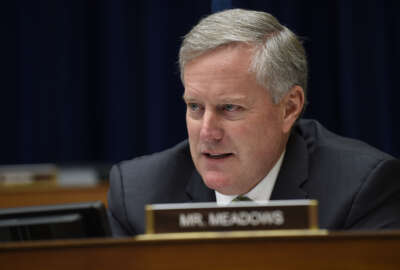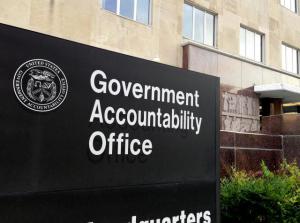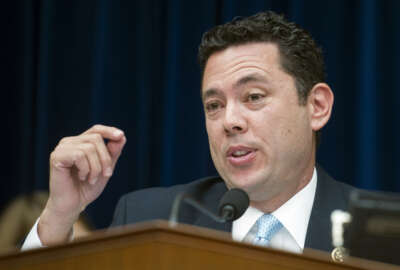
Lawmakers attack official time through retirement, bonuses
Two lawmakers have introduced legislation that would leverage pensions and benefits in an effort to reign in use of official time and has resulted in hours of...
Two congressmen have introduced legislation that would leverage pensions and benefits in order to reign in use of official time. The effort has resulted in hours of debate and a deeper divide on Capitol Hill over the subject of unions. This comes after a recent Government Accountability Office study on official time at the Veterans Affairs Department led to a contentious hearing before two House committees.
Official time is the term for time spent by federal employees performing union activities during work hours and is protected by law: the Federal Service Labor-Management Relations statute.
H.R. 1364: Official Time Reform Act of 2017
Rep. Jody Hice (R-Ga.) sponsored H.R. 1364, the Official Time Reform Act of 2017, which would forbid any days “spent principally on official time” — read 80 percent or more of the day — from counting toward an employee’s retirement under the Civil Servant Retirement System or the Federal Employees Retirement system.
“In essence, official time means that the American taxpayer is forced to subsidize federal employee unions, be it filing grievances, negotiating contracts and even political activities like lobbying Congress,” he said. “Federal employees are hardworking people who do important and often critical jobs for our nation. Many of these employees work for decades in their agencies and as such, they earn their retirement benefit from the federal government. However, when a federal employee spends a vast majority or even all of their time working on behalf of unions instead of their agency, they should not earn federal retirement benefits as though they had been executing the mission of the agency.”
The American Federation of Government Employees quickly came out in opposition to the bill, sending a letter to the committee.
“It is unconscionable to reduce federal employees’ pensions in an attempt to eliminate the use of official time in the workplace,” the letter said.
AFGE National President J. David Cox Sr. also objected in a separate statement.
“This legislation is a blatant attempt to bust federal employee unions and silence the voice of workers in decisions that impact not only their jobs, but services the American people rely on,” he said.
But Hice said unions and union workers would still be able to complete their functions.
“This bill is not taking away official time,” he said. “A person can still be 100 percent on official time if they want to. And they can work in the capacity that they believe is appropriate in using official time. It’s simply taking away a financial incentive for those who spend more than 80 percent of their time on official time.”
But AFGE said in the letter that limits on use of official time should be left up to the individual agencies, not imposed by Congress.
“Federal managers and their employees are fully competent to negotiate the terms of official time, when it is needed, how much is needed, and where it should be used to address unique agency and workplace issues,” AFGE said in the letter. “The ‘Official Time Reform Act of 2017’ undermines agencies’ ability to assign work, to utilize official time in the most efficient way, and it would prevent agencies from deciding either the schedules or the best use of employee representatives.”
Ranking Member Elijah Cummings (D-Md.), Rep. Gerry Connolly (D-Va.) and other Democratic lawmakers also objected to the bill, saying that it showed a fundamental misunderstanding of what official time is. They argued that official time is not time spent performing internal union business like lobbying or picketing, but on agency related work such as ensuring workplace safety, developing training materials for new employees and resolving grievances.
Many of those grievances, they noted, come from whistleblowers who turn to unions seeking support after instances of retaliation or discrimination. Union representatives use official time to advocate for those employees.
But Hice said that the bill would not affect whistleblowers adversely; they would still be able to seek representation and support.
“[Whistleblowers] are the bread and butter of this committee,” he said.
In addition, Democratic lawmakers provided stories of actual federal employees and how official time had benefited them. Notably, nearly all of these stories included veterans.
“Let’s think about the beneficiaries of official time,” said Rep. Matt Cartwright (D-Pa.). “It’s the President of the United States, it’s our American veterans, it’s our brave men and women who work in our federal prison systems. It’s not just the stereotypical greedy, lazy federal employee. These are the two greatest bogeymen of the far right wing in this country: union members and federal employees.”
After hours of debate, roll call votes on the amendment were requested and postponed.
This is not the first time Hice has taken on official time.
The Federal Employee Accountability Act, which Hice introduced in 2015, would have barred federal employees from using official time to negotiate collective bargaining agreements.
Hice also offered an amendment to the fiscal 2016 Military Construction and Veterans Affairs Appropriations Act that would have eliminated official time altogether at VA, but it failed to pass the House.
H.R. 1385
Rep. Virginia Foxx (R-N.C.) also submitted legislation that would amend Title 5 of the U.S. code, aiming at penalizing official time. H.R. 1385 would prevent federal employees from receiving recruitment, relocation or retention bonuses if they spend more than 80 percent of their time on official time.
“My amendment does comport with the underlying premise of Mr. Hice’s legislation: that federal employees who are operating on union time should be paid by the union’s dime, not the taxpayer’s. Congress should at the very least stave off the possible abuse of the recruitment and retention bonus structure authorized by the federal workforce flexibility act,” she said.
Democratic lawmakers also uniformly opposed this legislation.
“Representative Foxx’s amendment compounds the punitive measures imposed on union representatives,” Cummings said. “If the goal is to discourage individuals from serving as union representatives, this amendment and the underlying bill will accomplish that. This amendment would have devastating effects on the ability of unions to protect whistleblowers, victims of sexual harassment and discrimination, and our veterans in the federal workplace.”
H.R. 1293
The committee also considered H.R. 1293, which would require the Office of Personnel Management to submit an annual report to Congress regarding the use of official time by federal employees. It would also require agencies to submit information on official time usage to OPM.
Cummings also submitted an amendment that would require OPM to specifically track how much official time is spent on feds who are not union employees.
H.R. 1293 and Cummings’ amendment were both reported favorably to the house.
Copyright © 2025 Federal News Network. All rights reserved. This website is not intended for users located within the European Economic Area.
Daisy Thornton is Federal News Network’s digital managing editor. In addition to her editing responsibilities, she covers federal management, workforce and technology issues. She is also the commentary editor; email her your letters to the editor and pitches for contributed bylines.
Follow @dthorntonWFED





